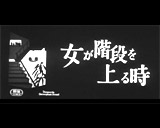
|
When a Woman Ascends the Stairs
(1960, Jp.) (aka Onna ga Kaidan wo Agaru Toki)
In Mikio Naruse's insightful yet grim 'women's picture'
melodrama - a critique of Japan's patriarchal society in the post-war
country, in the person of an aging, 30 year-old geisha girl supervisor,
working in a disreputable, competitive business in Tokyo's Ginza
district that catered to married male industrialists ("to show
them a good time"):
- the opening (voice-over) narration: "An afternoon
in late autumn. Bars in the daytime are like women without makeup"
- the resourceful, independent heroine protagonist:
a widowed, middle-aged, virtuous supervising bar hostess Keiko "Mama"
Yashiro (Hideko Takamine) - known for her high ideals, discreet and
stoic behavior, integrity and vows of celibacy to her dead husband's
urn; although always appearing beautiful and calm, she was struggling
to make ends meet in the competitive Ginza district - to lure customers
inside to supply them with drinks, companionship, and sometimes sexual
favors; she worried about her growing age and health: ("I feel
my youth fading day to day")
- Keiko's many regular and determined ascents of a narrow
staircase up to the bar - dressed in a traditional kimono to her
limited and disdainful occupation each evening: (voice-over) "Night
fell. I hated climbing those stairs more than anything. But once
I was up, I would take each day as it came"
- Keiko's voice-over musings about her profession: "Between
11:30 and midnight, the Ginza's 16,000 hostesses head home in droves.
The best go by cab, the second-rate take the train, and the worst
go off with their customers...My rent is 30,000 yen, a lot for one
person. But for us Ginza hostesses, an apartment's a fashionable
accessory, just like expensive clothes and perfume....Women working
in the Ginza fought desperately for survival. It was a battle I couldn't
afford to lose."
- the devastating scene in a dirty industrial slum -
the sequence of Keiko's conversation with an impoverished, overworked
Mrs. Sekine, who admitted that her husband Mr. Sekine (Daisuke Katoh)
was a "hopeless womanizer" at Keiko's geisha bar - she
confessed: "He lures them in with marriage proposals. I can't
count how often I've had to straighten things out. This time, he
borrowed the neighbor's car and hasn't been home in a week. I'm not
even jealous anymore, but our neighbor is angry...He's not bad at
heart. He just loves to show off. He lies and then begins to think
it's all true. That's just how he is" - while they talked, the
mother's two young children rode a tricycle (towing a noisy tin can)
in circles around them
- the last sequence when she agreed to sleep with married
client Mr. Fujisaki (Masayuki Mori) in her apartment, when he confessed
his love: "I love you. I always have"; apres-sex the next
morning, she told him about her "strange dream" she had
about her "late husband"
returning from a business trip; Fujisaki responded: "Even when
a woman's in your arms, you can never tell who's she really thinking
of"; she expressed her dissatisfaction about their arrangement: "I
love you but I'd prefer a husband. Someone always by my side. I don't
want to see you just once in a while. I'm happy now, though....But
I'm worried about one thing....When my husband died. I placed my picture
and a letter in with his ashes. I vowed I'd never love another man.
I wrote that down and asked the priest to put it in with him. I'm a
strange woman, aren't I?"; then, he dropped a bombshell - that
he was departing the next day for good, due to a job transfer to Osaka: "I
won't forget you. Call me if you ever come to Osaka. All I can do now
is help when you open your own place. I promise you that"; she
repeated: "I really do love you" - and he reciprocated, but
admitted that he couldn't break up his marriage: ("I don't have
the courage to break up my home. It may be selfish of me, but it's
the truth"); as he departed, he left her a monetary parting gift
- stock certificates worth 100,000; she was left devastated, especially
moments later when her manager Kenichi Komatsu (Tatsuya Nakadai) realized
that she had broken her vow of celibacy - and forcefully asked for
her hand in marriage - a request that she vehemently denied
- in the conclusion, facing emotional and financial
setbacks and defeats, and succumbing to drinking, absence from work,
growing anxieties, and a peptic ulcer (throwing up blood), Keiko
ascended up the stairs one more time - although her world was in
a tailspin; she narrated (in voice-over) - ever hopeful: "It
had been a bleak ordeal, like a harsh winter. But the trees that
line the streets can sprout new buds no matter how cold the wind.
I too must be just as strong as the winds that gust around me";
when she entered the upstairs bar's glass doors, she greeted everyone
with a welcoming smile: "Ah, welcome! It's been so long! Welcome!"
|
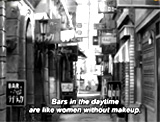
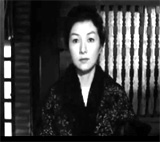
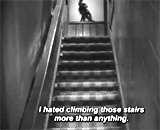
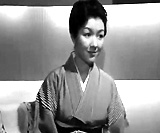
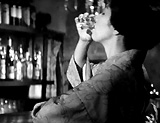

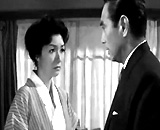
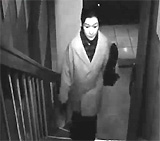
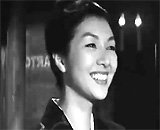
|










